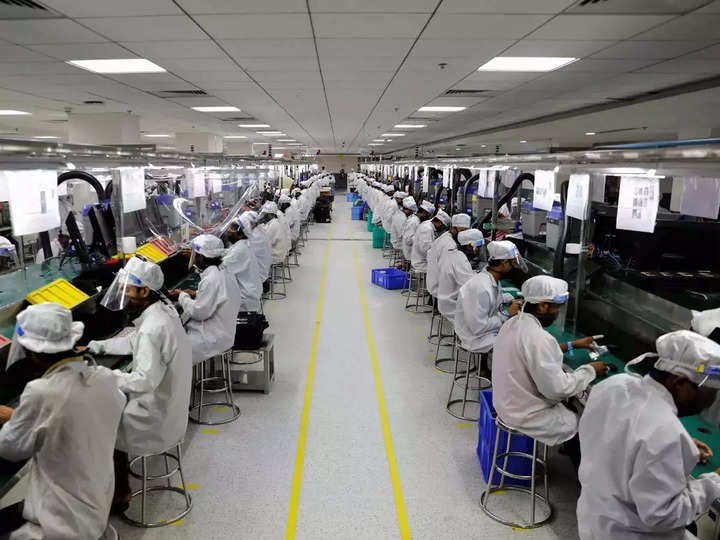[ad_1]

When the government announced the smartphone PLI scheme on October 6, 2020, it had projected that every new direct job in electronics manufacturing would create nearly three indirect jobs.
Apple‘s contract manufacturers and component suppliers have together created nearly 50,000 direct jobs in India since the smartphone production-linked incentive (PLI) scheme came into effect in August 2021, government officials said.
Apart from the direct jobs, nearly 100,000 indirect jobs could also have been created by the Apple manufacturing ecosystem in the country, they said, citing data submitted by the companies.
Electronics Sector Bucks the Trend
Foxconn, Wistron and Pegatron are the contract manufacturers for Apple’s iPhones in India. The component suppliers include Sunwoda, Avary, Foxlink and Salcomp.
Under the PLI scheme, every beneficiary must submit the job data on a quarterly basis to the ministry of electronics and information technology.
Samsung, which is also a beneficiary of the PLI scheme, employs more than 11,500 people at its Noida unit, the officials said.
Experts believe that Apple, through its contract manufacturers, may have become the largest provider of blue-collar jobs in India’s fast-growing electronics sector.
The government officials said Foxconn accounted for more than 40% of the jobs created by the three Apple contract manufacturers. While the facilities of Foxconn and Pegatron are in Tamil Nadu, Wistron is based in Karnataka.
A few thousand direct jobs have been added by the component and module providers, who have expanded capacity for the Apple iPhone supply chain over the last 17 months, the officials said.
Joint Manufacturing
Additionally, the Tata Group, which has set up a plant spread across 500 acres in Hosur to make smartphone components including for iPhones, employs about 10,000 workers. Tatas expect to increase the hiring to 45,000 in the next 18 months, officials said. In addition, the Tatas are also in discussions with the Wistron group to jointly manufacture iPhones in India.
While the manufacturing sector, as per a report by Delhi-based Centre for Monitoring Indian Economy, had seen job losses over the last few years, the electronics sector is turning out to be an outlier, propelled by the smartphone PLI scheme, the officials said.
The scheme was originally launched by the government in April 2020, but commenced from August 1, 2020 after the guidelines were notified. Later, the scheme was extended by a year due to the Covid-19 pandemic, so the effective starting date of the scheme for Apple’s contract manufacturers was August 2021.
Reducing Reliance on China
Currently, Apple’s three suppliers make iPhones 11, 12, 13 and 14 in India for the domestic market and exports. In September 2022, Apple started manufacturing the latest iPhone 14 in the country, within 10 days of the phone’s global launch. Apple has been building manufacturing capacity in India as it looks to reduce dependence on China in the longer run.
When the government announced the smartphone PLI scheme on October 6, 2020, it had projected that every new direct job in electronics manufacturing would create nearly three indirect jobs.
In fiscal 2021, Apple exported iPhones worth Rs 11,000 crore in its first year under the PLI scheme. Exports in 2022 have been estimated at more than Rs 20,000 crore.
According to experts, Apple locally produces 85% of the phones it sells in India. Before the introduction of the PLI scheme, it was importing nearly 90% of the phones from China.
FacebookTwitterLinkedin
[ad_2]
Source link


